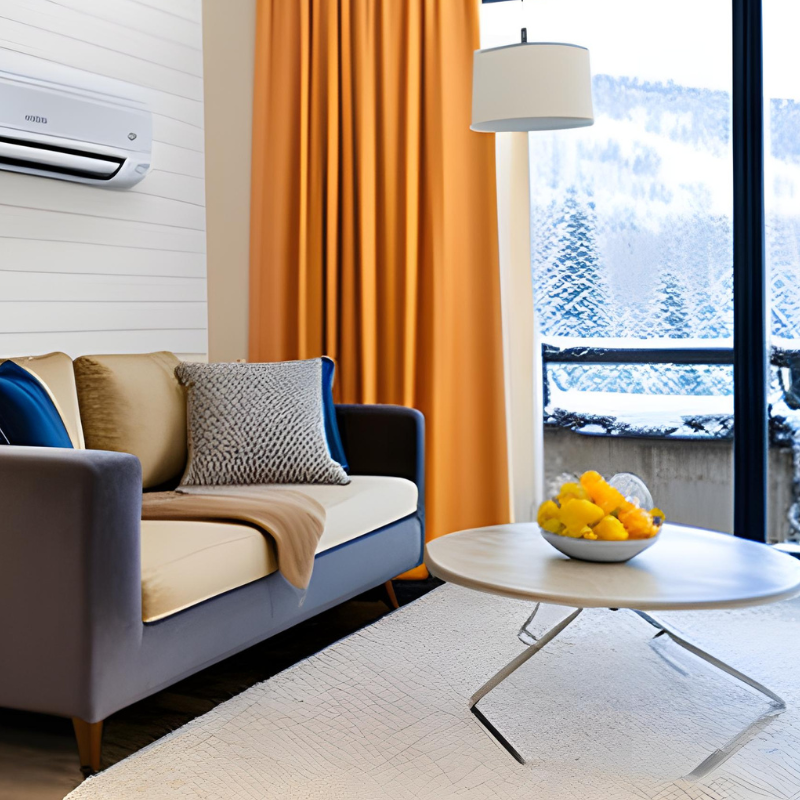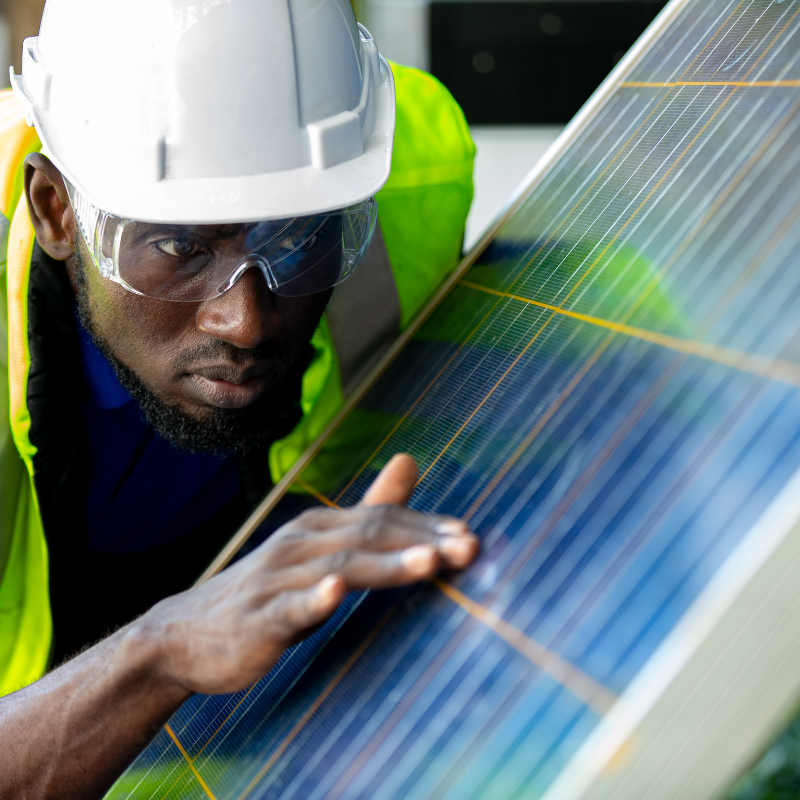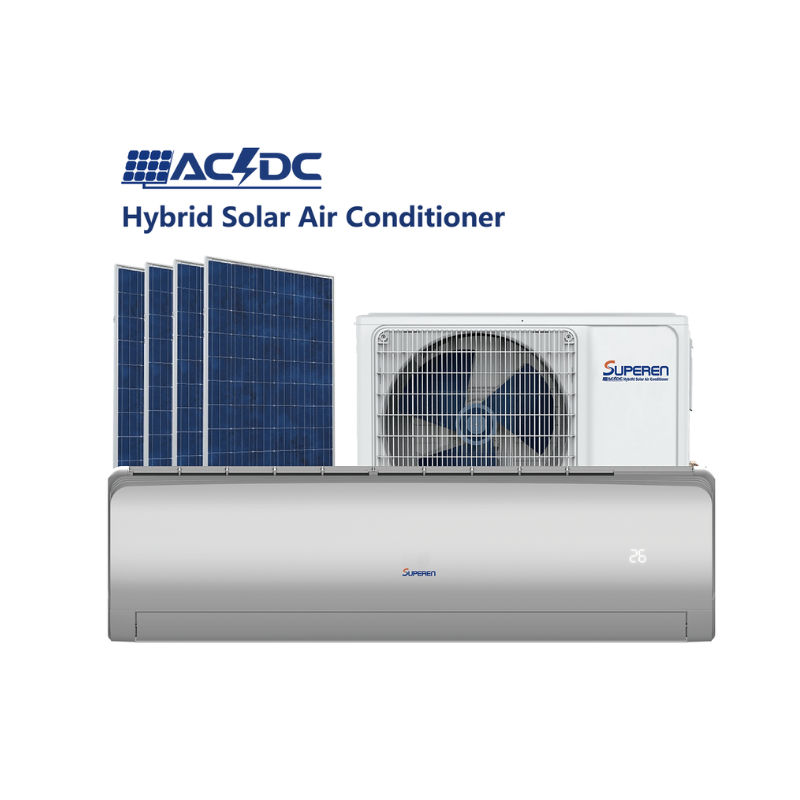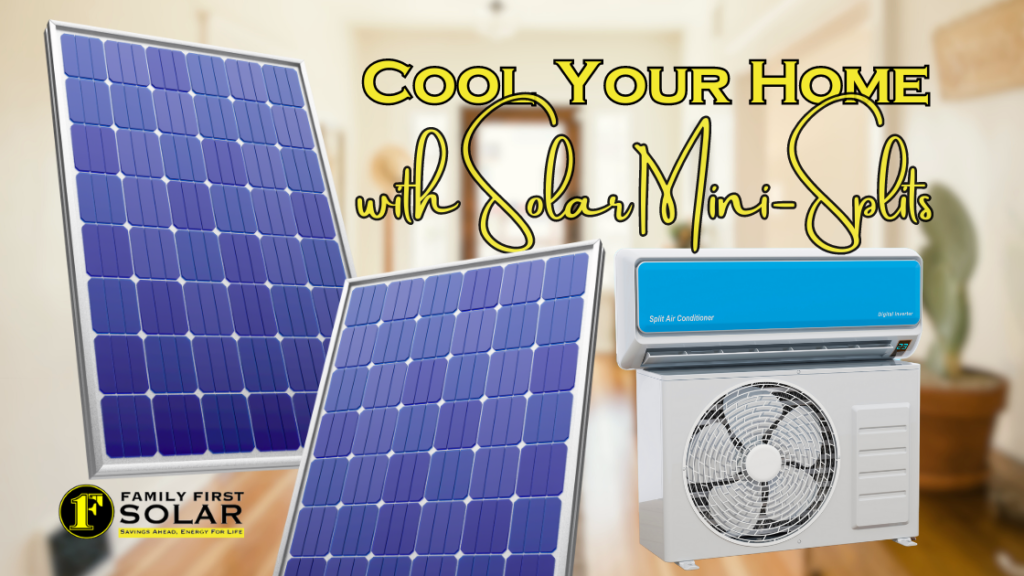Cool Your Home with Solar Mini-Splits
Solar powered air conditioning is a technology/appliance that some homes find to be very helpful in reducing their cooling bills. We install them here at Family First Solar, and we definitely recommend them to our clients when it matches their needs.
In this blog article, we’ll explain how solar air conditioning works, how it can tie in with the rest of your solar panel system, and share when it might make the most sense to use solar AC.
How Does Solar Power AC Work?
In the simplest terms, solar AC is an air conditioner powered by its own solar panels as a free-standing unit.
Types of Solar Air Conditioning
There are a few different systems of solar air conditioning. The most common kind is a hybrid system, which uses solar power to power the unit during the day, and can use electricity from the grid when there is no available solar power. In other words, it uses both DC power from solar and normal AC power.
Another option is to get a solar AC system with a storage battery that can store energy created during the day to use at night. This is especially vital in hotter climates where homeowners need to run the air conditioning overnight.
This type of solar AC typically also uses an inverter to turn the DC power into AC power and these air conditioning systems run on AC power.
And lastly, if a home already has a solar array and is off the grid, the solar air conditioner can pull power from the home’s solar system as needed, which is an option that can work with an AC, DC, or hybrid powered air conditioner.
Additionally, it’s worth noting that there are both solar powered central air conditioning which is a ducted system, and solar powered mini splits.
But it’s far more common to see a solar mini split air conditioner, which is similar to a standard mini split air conditioner.
For the sake of this article, we will focus on the mini split variety, because that’s the kind we install at Family First Solar.
The Process of Solar AC
Solar air conditioning is similar to a traditional mini split, where an outdoor condensing unit is cooling refrigerant. That refrigerant then flows into the indoor unit, where the refrigerant cools the air, and then the cool air is pumped into the room.
What powers this operation is what makes solar AC unique.
You may be wondering how having solar AC is different than having normal solar panels on your home that power everything, including the AC.
Well in that instance, solar panels collect the sun’s energy as DC power (read all about it on a past blog) and then that power goes through an inverter to be turned into AC power that is ready to be used in your home.
Regardless of how efficient the system is, there is inevitable energy loss in the conversion of DC power to AC power. But most solar air conditioners have the ability to use DC power, enabling them to be even more efficient.
How Many Solar Panels Are Needed to Run a Mini Split?

The amount of solar panels needed to run a mini split air conditioner really depends on the home size, and how many indoor units you’ll have.
Each evaporator zone (or indoor unit) uses 500-700 watts per hour, and each solar panel makes between 250-400 watts per hour. So when you crunch the numbers, that means it takes roughly two solar panels per zone to run a solar AC unit.
However, if you purchase your solar AC through a reputable solar company, they’ll make sure they help you crunch the numbers, looking at your past energy usage, and ensure you have the right number of panels to maintain your unit.
Do Solar Mini Splits Also Heat My Home?

Here in Hawai’i many of us don’t need to worry about heating our homes. But some locations throughout the islands might benefit from turning on the heat on a cool night.
And if you came across this blog and you’re not lucky enough to live in Hawai’i, we’ll answer this question for you too!
Yes! Mini splits do both heating and cooling. So an ideal way to get solar powered heating is through solar mini splits. This method is effective enough to be your main heating system in most locations—certainly here on the islands.
However, if you live in a climate that gets much colder than 20 degrees Fahrenheit, you’ll likely need to consider a different primary heating system. Of course, solar availability would likely come into play if you live in that cold of a climate as well.
Solar mini splits can help you greatly reduce your heating costs, paying for themselves in just two to three years.
How Much Does a Solar Air Conditioner Cost on Average?

A solar air conditioner, like any appliance, doesn’t have a fixed cost, but according to Angi, the average solar air conditioner costs $3,400 plus installation.
The cost is definitely impacted by the size of your home and your energy needs because if you have a bigger home, you’ll need more solar panels to cover the cooling cost.
However, one major advantage of choosing solar AC over central AC is that you can receive the solar tax credits to get a lot of your investment back, saving you big compared to central AC.
Can You Use the Solar Tax Credit for Solar AC?
Yes, you absolutely can use the solar tax credit for solar air conditioning. If you don’t have a solar system already, you might now be aware of how incredible to solar tax credits are here in Hawai’i.
If you need to replace your air conditioning or are deciding on an air conditioning system for a new build, the tax credits alone might be enough to sway your decision to a solar air conditioner.
The Federal Solar Tax Credit returns 30% of your investment on your upcoming tax return. And here in Hawai’i you can take advantage of the state tax credit, which returns 35% of your investment in your state tax return.
What’s a Good Case for Using Solar AC Versus Central Air?
There are several reasons why you’d choose solar AC over central air.
You already have solar panels, but you’re not completely off the grid and want to be.
While solar panels allow people to reduce their heating and cooling bill significantly, some people want to be off the grid entirely, never to have to take energy from the grid. For them, it’s not about the bill, it’s about the energy self-sufficiency.
In this case, replacing your central AC with a solar air conditioner might be the difference between having to use a small amount of energy from the grid and being entirely energy self-sufficient. This is because solar AC is more efficient because of its DC power usage.
And when your solar AC design will include a few additional panels that will cover the power needed to operate the AC entirely.
You’re looking for ways to make a new build energy efficient.
If you don’t already have central AC, like in the case of a new build, or if your home has just never had AC, and you’re able to make a choice between the two, a solar air conditioner does have it’s advantages.
They’re very efficient once you have them installed, and you can have some of your investment returned to you via solar tax credits like we mentioned above.
Mini splits allow for more control.
Mini splits (solar or otherwise) also give you more control to set different zones of the home to different temperatures, which you can’t do with central air conditioning. For example, you can set the temperature to 62 degrees in the room where the person who runs hot sleeps, while you keep it at 68 degrees in the rest of the home.
Or, if you have a room that gets a lot of direct sunlight and gets really hot, you can cool that room more without having to waste money and energy by keeping the whole house that cool.
What’s the Best Solar Mini Split Air Conditioner?

At Family First Solar, we’ve been installing solar panels for 20 years, including solar air conditioning. We trust Superen, and most often, we will recommend their hybrid model so that customers can still use AC power from the grid or from the home’s solar system as needed, like at night or when it’s cloudy.
Whether or not you already have a solar system at your home, schedule a free consult with Family First Solar by calling (808) 724-4072 to determine if solar air conditioning is right for you. Not only are we experts in solar, but we have a licensed HVAC technician on our team that will ensure that you have seamless cooling.


